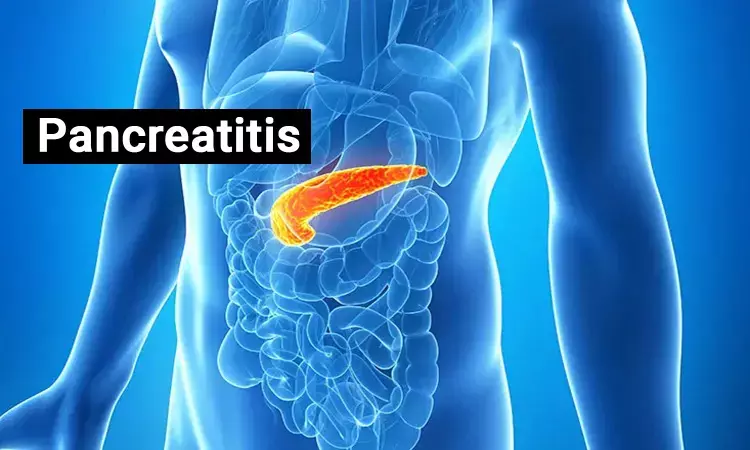- Home
- Medical news & Guidelines
- Anesthesiology
- Cardiology and CTVS
- Critical Care
- Dentistry
- Dermatology
- Diabetes and Endocrinology
- ENT
- Gastroenterology
- Medicine
- Nephrology
- Neurology
- Obstretics-Gynaecology
- Oncology
- Ophthalmology
- Orthopaedics
- Pediatrics-Neonatology
- Psychiatry
- Pulmonology
- Radiology
- Surgery
- Urology
- Laboratory Medicine
- Diet
- Nursing
- Paramedical
- Physiotherapy
- Health news
- Fact Check
- Bone Health Fact Check
- Brain Health Fact Check
- Cancer Related Fact Check
- Child Care Fact Check
- Dental and oral health fact check
- Diabetes and metabolic health fact check
- Diet and Nutrition Fact Check
- Eye and ENT Care Fact Check
- Fitness fact check
- Gut health fact check
- Heart health fact check
- Kidney health fact check
- Medical education fact check
- Men's health fact check
- Respiratory fact check
- Skin and hair care fact check
- Vaccine and Immunization fact check
- Women's health fact check
- AYUSH
- State News
- Andaman and Nicobar Islands
- Andhra Pradesh
- Arunachal Pradesh
- Assam
- Bihar
- Chandigarh
- Chattisgarh
- Dadra and Nagar Haveli
- Daman and Diu
- Delhi
- Goa
- Gujarat
- Haryana
- Himachal Pradesh
- Jammu & Kashmir
- Jharkhand
- Karnataka
- Kerala
- Ladakh
- Lakshadweep
- Madhya Pradesh
- Maharashtra
- Manipur
- Meghalaya
- Mizoram
- Nagaland
- Odisha
- Puducherry
- Punjab
- Rajasthan
- Sikkim
- Tamil Nadu
- Telangana
- Tripura
- Uttar Pradesh
- Uttrakhand
- West Bengal
- Medical Education
- Industry
Neostigmine may reduce pancreatitis-induced intra-abdominal hypertension

Neostigmine reduces Intra Abdominal Pressure and promoted defecation in patients with Acute Pancreatitis and Intra Abdominal Hypertension, according to a new study.
One of the most frequent digestive system illnesses is acute pancreatitis (AP). Severe acute pancreatitis (SAP) combined with prolonged organ failure increases the chance of mortality. Intra-abdominal hypertension (IAH) is defined by the World Society for Abdominal Compartment Syndrome (WSACS) as a sustained rise in intra-abdominal pressure (IAP) of 12 mmHg or above. IAH is regarded as a risk factor early in the development of SAP.
Neostigmine is an anticholinesterase medication that may increase intestinal peristalsis, hence facilitating flatus and faeces transit. Neostigmine treatment efficiently promotes colonic decompression in individuals with pseudo-obstruction of the colon. The WSACS recommended that neostigmine be used to treat established colonic ileus associated with IAH that does not respond to other straightforward treatments.
The purpose of this study was to determine the effectiveness of neostigmine in lowering IAP in patients with AP and persistent IAH after 24 hours of conventional therapy, regardless of whether colonic pseudo-obstruction was demonstrated using X-ray or computed tomography.
Consenting patients with IAH within two weeks after AP start received standard therapy for 24 hours in this single-center, randomised study. Patients with persistent intra-abdominal pressure (IAP) 12 mmHg received either injectable neostigmine (1 mg every 12 h raised to every 8 h or every 6 h, depending on response) or continued with standard therapy for 7 days. At 24 hours following randomization, the main outcome measure was the percent change in IAP.
Eighty individuals were randomised to either neostigmine (n = 40) or conventional therapy (n = 40). No significant variation in baseline values was observed. By 24 h, the neostigmine group had considerably lower IAP than the conventional group (median with 25th–75th percentile: 18.7 percent [ 28.4 to 4.7 percent] vs. 5.4 percent [ 18.0 percent to 0], P = 0.017). This impact was stronger in individuals with a baseline IAP of less than 15 mmHg (P = 0.018). The results of the per-protocol analysis corroborated these findings (P = 0.03). Throughout the seven-day monitoring period, the neostigmine group consistently had larger stool volumes (all P 0.05). Other secondary outcomes did not vary substantially between the groups receiving neostigmine and those receiving conventional therapy.
Neostigmine medication was considerably more successful than conventional treatment in lowering IAP in AP patients with persisting IAH after 24 hours of conventional treatment, according to this first randomised controlled study (including gastrointestinal decompression, glycerin enema, negative fluid balance, and ascites drainage). IAP decreased after three hours of neostigmine treatment, was most obvious during the first 15 hours, and was more prominent in individuals with severe IAP (> 15 mmHg) at baseline. Neostigmine inhibits anticholinesterase activity, increasing the availability of acetylcholine for ligation of nicotinic ion channel receptors and muscarinic G-protein receptors that initiate second messenger cascades. Neostigmine was shown to successfully lower IAP in patients with AP and IAH who were not responding to conventional therapy by improving intestinal peristalsis and facilitating defecation, particularly in individuals with baseline IAP greater than 15 mmHg. These findings support the conduct of a larger, multi-center phase III study to evaluate the effect of neostigmine on the complications of AP due to diverse etiologies.
Reference –
He, W., Chen, P., Lei, Y. et al. Randomized controlled trial: neostigmine for intra-abdominal hypertension in acute pancreatitis. Crit Care 26, 52 (2022). https://doi.org/10.1186/s13054-022-03922-4
MBBS, MD (Anaesthesiology), FNB (Cardiac Anaesthesiology)
Dr Monish Raut is a practicing Cardiac Anesthesiologist. He completed his MBBS at Government Medical College, Nagpur, and pursued his MD in Anesthesiology at BJ Medical College, Pune. Further specializing in Cardiac Anesthesiology, Dr Raut earned his FNB in Cardiac Anesthesiology from Sir Ganga Ram Hospital, Delhi.
Dr Kamal Kant Kohli-MBBS, DTCD- a chest specialist with more than 30 years of practice and a flair for writing clinical articles, Dr Kamal Kant Kohli joined Medical Dialogues as a Chief Editor of Medical News. Besides writing articles, as an editor, he proofreads and verifies all the medical content published on Medical Dialogues including those coming from journals, studies,medical conferences,guidelines etc. Email: drkohli@medicaldialogues.in. Contact no. 011-43720751


